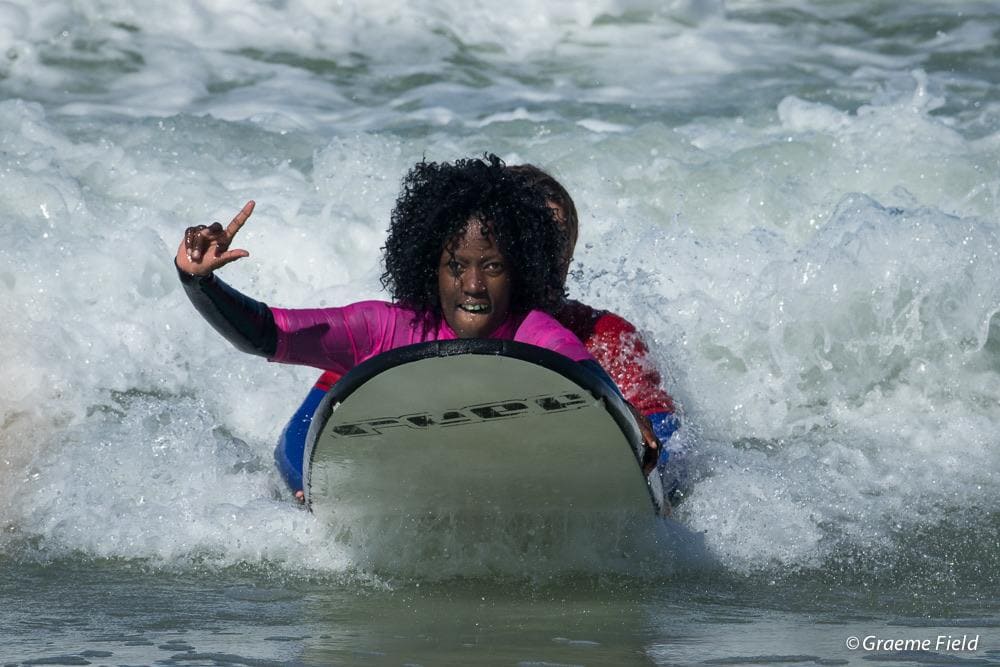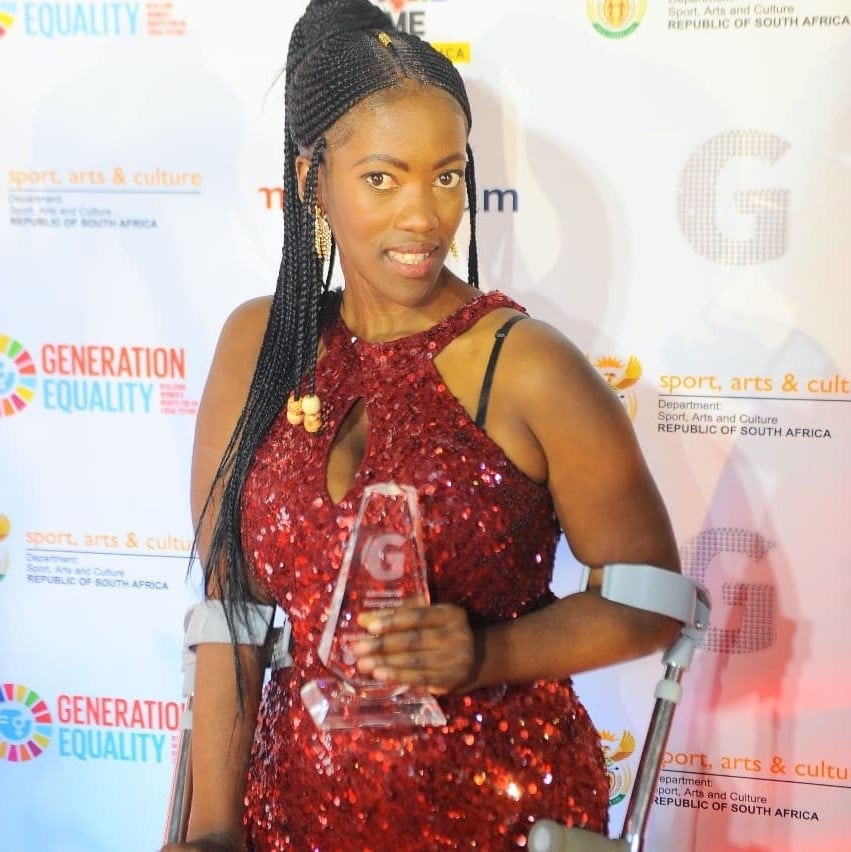Noluthando Makalima and adaptive surf: living life into the waves
Noluthando Makalima is a 32-year-old adaptive surfer from Cape Town; born with a cerebral palsy, she currently represents in the surf context- and not only – a real example of passion and hope. She won a silver medal at the 2020 World Paralympic Championship and she recently received the Ministerial Recognition of Excellence Award at the GSport Awards, an annual event that celebrates sport female talents from South Africa.
Noluthando is a young woman, a mother, a talented athlete who never let her disability define her history as well as her sport career. This doesn’s mean that she never faced hardships in life: being disabled is an everyday challenge, especially when it comes to social stigma and everyday life in the public space.
Talking with her gave us the chance to a deeper understand what makes her a model of strenght and gumption; her experience proves one more time how sport can change the way we see ourselves, the way we perceive our body.
How long have you been doing surf? And why did you choose surf as a sport?
I started doing adaptive surf in December 2014; at the beginning, I was doing it just for fun, to try something new, thanks to the encouragment of a member of the disabled people support association I had joined earlier that year. When I went to America with my team, something changed. Surf changed my life. I endend up loving it because I noted how people could transform their mindset by seeing that even disabled can surf. We are talking about a very particular sport: not everyone can imagine that people with disability have the possibility to practice it.

What’s your relationship with the team?
I can say that the relationship I have with my team is so unique. I feel blessed of being in the South African Surfing Team because every member is friendly. We chat almost every week, just to check if we are ok, just to keep in touch.
Would you describe us what’s your disability?
I have a cerebral palsy since I was born. It affects my speech and the way I walk, my balance is not good so I have to use crutches.
Your main physical problem, as we understood, is about balance. That’s why you use crutches. So how do you find balance on your board while you are in water?
I find balance in two ways: thanks to my surfboard and thanks to my coach. One holds me in water and one couches me outside water, supporting me with encouraging words. So when I’m surfing I trust the two a lot, I count on them and I feel free and safe.
We know it’s not always easy to be a sportwoman with a disability. How did you live and deal with sports? Which kind of difficulties or problems have you faced during your career?
Yes, it’s not easy. Primarily, people are not taking you seriously, your family included; sometimes they believe surf (or in general a sport career) it’s just a whim, something that will pass or just a passionate hobby; it’s important to be strong and tell yourself that you won’t let others discourage you.
I faced so many challenges concerning my disability. Social stigma is the hardest and I have to face it everyday. My palsy affects my speech so I have to make sure that people hear me clearly and sometimes someone laugh at me; I keep feeling strong, I don’t feel angry, it’s worthless: I can’t change my disability.
People often assume that disabled people should be happy with doing very little in life, just what is essential, not something like surf; so everytime I have to explain to my community that even with my palsy I can do “this” or “that” or anything that I like. I must explain that living with a disability doesn’t mean to remain passive or lifeless, but it’s right to have desires and passions and to do whatever is possible to satisfy yourself.
My daily life career is full of challenges, but I trust God and I feel that one day I will be able to overcome everything. Firstly, finding a sponsor has been one of the main challenges for me. It’s also necessary to find and have money, in order to practice the sport at a high level and to attend games; this isn’t always easy. For example, I have to borrow wetsuits and surfboards because I don’t have mines.
Moreover, one of the hardest things for me is transport – especially public means of transport. It affects not only my daily life, but my career too. We – as disabled people – struggle to get transports; it’s so difficult to use them, and to reach them. It’s challenging in our everyday life, particularly for people like me who use crutches or wheelchairs. Public space and transports are not properly accessible to us!
We all can affirm that surf is a kind of extreme sport; what do you think about it? Did you ever think that having a disability could become for you a limit?
I agree with this statement, in fact I’ve never thought I would be able to do it in my life and I would have become the person I am now. But for me, being disabled never represented a limit; my disability never limited me in anything I wanted to achieve in life. Anyway, surfing changed the way I see myself. I became the kind of person I feel to be today, thanks to surf.
Do you know people with the same experience as yours? If you do, which kind of disabilities do they have? Do you think they have to face the same challenges as you or do they live another type of experience?
Yes, for example my team mates are disabled people, but I can’t properly explain what their disabilities consist of. For sure, concerning sport, we faced similar challenges, but difficulties in life are different and related to personal history and personality, families, social class, etc.
What’s the situation of parasports in your country? What can you tell us especially about surf?
I don’t know a lot about other parasports, but speaking about surf, my experience tells me that one of the most relevant problems is “mentality”, what people think about disability and extreme sports. I had to face a lot of social challenges: people are not aware and sometimes they think it’s impossible to surf with a disability. I had to convince people around me that adaptive surf needs the same kind of commitment and responsability as other parasports, and that it’s not so dangerous as they think. Surfing is the best therapy to me: it helps me release my stress and it makes my body feel free.

What would you like to say to young girls and boys who, like you, would like to start a professional career as surfers or sportwomen/sportmen in general? Do you have any advice?
I would sincerely say: girls and boys, don’t hesitate. Of course it’s important to work hard. Keep doing sports and follow your passions.
There are two associations I know that help people with disabilites start and continue practicing sports: “Made For More” and “Roxy Davis Fundation“; the latter is focused especially on surfing as therapy and a possibility for everyone.
According to you, is it easy for disabled girls and boys to get in contact with sports?
I think that it’s not so difficult to get in contact with sports, even if you are disabled. I can say this according to my experience. If you really want to practice sport, there are a lot of organizations that advertise at a local level and can help you start doing what you like.
Do you think that your country should improve parasport conditions?
I think that my country should launch national campaigns to raise awareness about the opportunities disabled people have, especially about surf. And also, it’s important to improve economic conditions and to give more possibilities to train and compete. I can say that economic and social circumstances aren’t the same for everybody and, speaking about surf, our government believes that adaptive surf is dangerous for people like us.
Which projects do you have for your future as a professional surfer? Will you start to compete again this year and what kind of desires or purposes do you have?
I’m currently looking for a job, because we have temporarily stopped our activity, but when it comes to training I have to face economic struggle: I don’t get paid while I’m training. Anyway, I would like to compete again this year and for sure next year because this is the sport I like. I want to improve and continue my career.
My desire is to reach higher levels and become a role model for someone.
Do you think that your strenght and personal experience can inspire other girls?
Yes, I know for example that a lot of people are inspired by my ability to surf. I think that my experience can inspire other girls to start surfing or some other sport, in spite of their disabilities. I receive everyday a lot of solidarity and encouragment messages. This makes me proud and boosts my willpower.

Wow what a person
What courage
What determination
From Australia all the best
Love it when you say i take my anger with me!!!
Beyond beautiful 😍